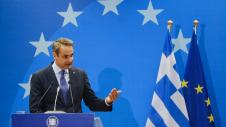Prime Minister Kyriakos Mitsotakis expressed satisfaction along with other EU leaders for the agreement reached with Britain over Brexit, at a press conference following the European Council summit on Friday.
"There was satisfaction, relief and sadness, as most of the European countries did not wish this development," Mitsotakis said, but he expressed the hope that the British parliament ratifies the agreement.
Greece came to the table with clear positions on the EU's next long-term program for 2021-2027, the premier said, stressing that "the total level of available funds cannot drop below that of the European Commission's proposal." The Commission's proposal, described as an "ambitious yet realistic" one, is expected to reflect developments in innovation, the economy, the environment and geopolitics, among other issues. Mitsotakis cited difficult negotiations among member states and disagreements, but noted that "if Europe wants to play a substantial, economic and geopolitical role, it must accompany this with the appropriate funding." He made special mention of the Common Agricultural Policy program, which needed updating, but stressed "we will not accept a reduction in funding."
The PM made special mention of the migration issue and reiterated that "following our pressing intervention" the resulting document of the meeting "included the mention that the EU supports countries like Greece in which refugee and migration flows are challenging, as a result of developments in the East Mediterranean." He said this constituted "a recognition of the fact that the management of this issue cannot depend on Greece alone. I reiterated the refugee issue's European perspective, calling for European support and solidarity."
Speaking of the recent spike in the influx of migrants, he noted that the EU-Turkey joint statement should be enforced. "Whoever has no right to asylum should return to Turkey the soonest possible. Fifty thousand came and 2,000 returned," he said, noting that the government is trying "to do as fair a distribution of migrants as possible, with priority given to vulnerable groups."
Calling for the revision of the Treaty of Dublin's provisions on returning migrants whose applications for asylum are rejected, Mitsotakis also pointed out the issue of other EU member states who "refuse to participate in sharing the burden." This policy, he said, "is irrational, it is unacceptable. We cannot speak of European solidarity and not accept any fair distribution. There is recognition that Greece is at the front lines, and there is greater sensitivity to supporting Greece."
Mitsotakis said he had raised the issue of the EU's drawing a Plan B on migration in case the union has to face again inflows that are not manageable. There is no such plan currently, he said. "I cannot accept that the EU could be caught unprepared again before such a prospect. I do not believe Turkey will go ahead and carry out its threat of opening its borders [for migrants to leave]. But we must be prepared for the worst, so we are not caught unawares," he stressed.
Referring to Turkey, he said all EU leaders unanimously condemned its attack of Syria and its illegal drilling activity in Cyprus' EEZ.
"Unfortunately," he said, "we were not able to agree on enlargement in terms of the western Balkans," the premier said, referring to the disagreements leading to the delay of starting EU accession talks for North Macedonia and Albania. The issue is postponed for 2020, he said, while adding that "Greece always supports the European future of the West Balkans. We have specific prerequisites," which in North Macedonia's case are repect of the Prespes Agreement and in Albania's respect of the rule of law and the rights of the Greek minority, especially in property ownership.
Asked whether he had met with North Macedonia's prime minister Zoran Zaev, the Greek premier said he had had no contact with him while in Brussels. He added that despite believing that the Prespes Agreement is "problematic, I will not use it as an obstacle against the accession" of the country to the EU.
Speaking of the lack of consensus for the start of accession talks in the case of the two neibhoring countries, Mitsotakis said, "I believe this is not good either for the general stability in the Balkans or for Greece. The strongest weapon in Greece's hands relates to these countries' European future. The closer they are to European accession, the greater our ability to manage issues on a bilateral level, in the context of changes they have to carry out."
Mitsotakis thanked outgoing Presidents of the European Commission Jean-Claude Juncker and the European Council Donald Tusk, respectively, for their contributions. In Juncker's case in particular he said he "thank(s) him both as a Greek and as a European" for supporting Greece when others didn't during the crisis and of keeping his European spirit alive.
(ANA-APE)








